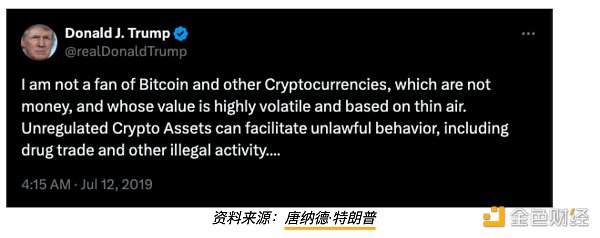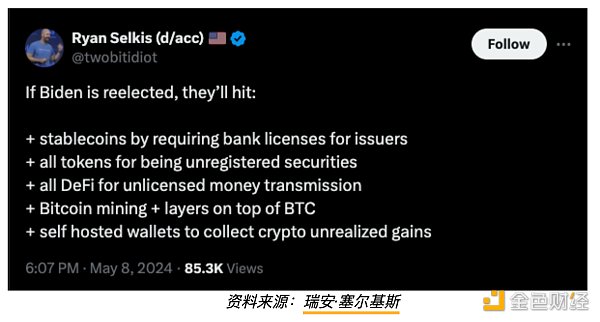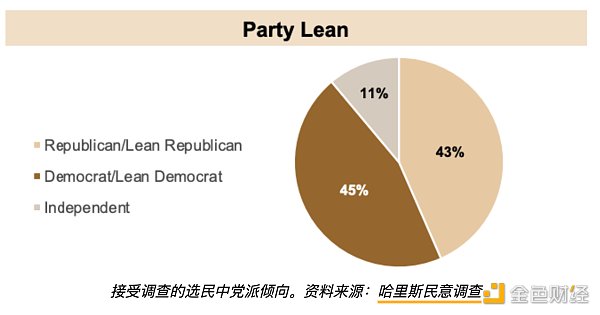Author: Daniel Ramirez-Escudero Source: cointelegraph Translation: Shan Ouba, Golden Finance
Americans will go to the polls on November 5 to elect the next president. The upcoming election is expected to be a tight race due to increasing electoral polarization and generally low voter turnout. As Election Day approaches, presidential candidates are vying for public trust and promising a brighter future.
Now, cryptocurrencies are involved in this race.
Former President Donald Trump appears to have shifted on cryptocurrencies, taking a more conciliatory stance and promising a "good and stable" future for the cryptocurrency industry in the United States.
Is Trump really an "orange pill," or is he simply turning cryptocurrency into another partisan political football to secure votes as Election Day approaches?
Trump's Changing Views on Cryptocurrency
Trump has been generally critical of cryptocurrencies throughout his presidency. He has leveled many of the common criticisms from politicians, primarily arguing that cryptocurrencies are "without basis" and are being used for drugs and other illegal activities.

But as the 2024 election approaches, Trump has changed his rhetoric.
On May 8, at an event for non-fungible token (NFT) holders at his Mar-a-Lago resort in Florida, he surprised the crypto community by accusing President Joseph Biden and current SEC Chairman Gary Gensler of conspiring against cryptocurrencies and presenting his candidacy as an alternative for pro-crypto voters.

Crypto Community Criticizes Biden’s Policies
Trump recently pledged to become a crypto warrior after the Biden administration threatened to veto HJRes. 109 SEC Crypto Act, allowing U.S.-regulated financial institutions to custody cryptocurrencies.
Influential cryptocurrency advocates have come out in support of the bill, including Ethereum co-founder and Cardano founder Charles Hoskinson, who accused Biden's presidency of "hurting the industry in every possible way."
Hoskinson mentioned in a recent article that the Trump administration "largely ignored" the cryptocurrency industry, while "the Biden administration has taken a concerted action to kill cryptocurrencies."
Ryan Selkis, founder and CEO of blockchain analysis company Messari, claimed that: A vote for Biden is a vote against the U.S. cryptocurrency industry, and if Biden is re-elected, the crypto industry will face a series of hostile regulations.

Trump has taken note of the crypto community’s dissatisfaction with Biden, claiming that “cryptocurrency is exiting the United States because of the hostility toward cryptocurrencies.” Trump said that in order to stop the cryptocurrency industry from migrating from the United States, “we have to keep them here.”
Does Trump Really Care About Cryptocurrencies?
While some in the crypto community have declared their allegiance to Trump, others are more cynical about the former president’s motives.
Monica Taher, former director of technology and business innovation for the Salvadoran government, said cryptocurrencies “are being used by some opportunistic politicians to boost their own status and present themselves as innovators.
Trump is a clear example of this opportunism, as Trump confirmed at the NFT holder event that he was “initially against cryptocurrencies, but now, due to financial difficulties, is even accepting donations in this way.”
Trump’s campaign has been spending heavily to defend the former president against 91 felony charges in two state courts and two federal districts. Cryptocurrencies could offer a cash-strapped campaign a way to access new funds.
Trump’s new pro-crypto stance “falls into a familiar pattern of making a positive statement about cryptocurrencies, promising to promote innovation, and then moving on.” However, he believes that “as vague as his latest effort to get the cryptocurrency vote is, no matter how insincere or vague, it could prove effective.” ”
Taher, who has extensive experience working closely with politicians, advises trusting only those who actually promote this new monetary system to voters, as “the main focus should be financial inclusion and not just a marketing strategy. ”
Cryptocurrency Holders’ Votes May Be Correlated with Swing States
Whatever the former president’s motivations, Trump may soon find himself with a new voting district.
A poll released by Paradigm on March 14 showed that 19% of registered U.S. voters have purchased cryptocurrencies, concluding that “a fifth of the country’s population is not a niche group.”
The Paradigm poll further suggests that cryptocurrency holders are willing to switch parties. The survey showed that 48% of respondents support Trump in 2024, but only 39% voted for him in 2020.
This could be crucial in turning the tide in so-called “swing states” where the election results are far from certain.
On May 7, Digital Currency Group (DCG) partnered with Harris Poll to release a survey titled “Crypto Attitudes in Swing States.” The poll collected data from Michigan, Nevada, Ohio, Montana, Pennsylvania, and Arizona.
The study showed a positive desire to vote, with 93% of voters claiming they plan to vote in the upcoming election. This data point is particularly significant for a state that has traditionally been known for low voter turnout. Additionally, 74% of voters consider themselves politically engaged.
These voters are nearly evenly split politically, with 43% leaning Republican and 45% leaning Republican. of voters lean toward the Democratic Party.

But cryptocurrency is far from the only issue on the ballot this November. Will the presidential candidates’ stance on cryptocurrency be crucial to winning?
According to the DGC survey, 26% of respondents said they are concerned about the candidates’ stance on cryptocurrency, and 21% said cryptocurrency is an important issue to consider during the upcoming election.
Respondents’ overall stance on cryptocurrency can likely be attributed to a sense of overregulation: 55% are concerned that policymakers will stifle innovation through excessive regulation.
The November election is nearly six months away, so there is plenty of time for the candidates' positions to change, or for Trump's legal troubles to develop further.
If Trump wants to build a decisive voting bloc of cryptocurrency holders, he must convince voters that he is a true advocate, such as by offering concrete crypto plans.
Otherwise, it may just be another politician's empty promise.
 Wilfred
Wilfred









